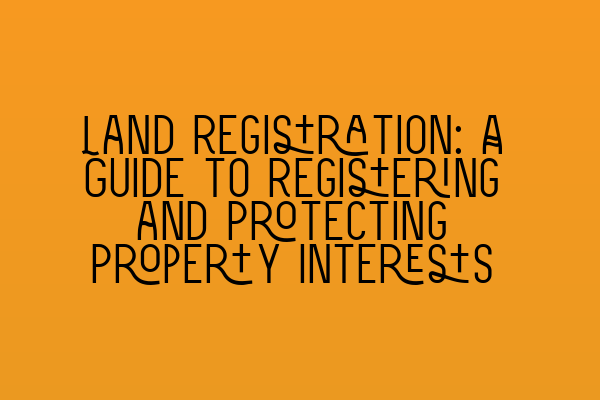Land Registration: A Guide to Registering and Protecting Property Interests
Welcome to SQE Property Law & Land Law! As solicitors specializing in property law, we understand the importance of land registration and protecting property interests. In this comprehensive guide, we will take you through the process of land registration, ensuring that you have a clear understanding of how to protect your property rights.
What is Land Registration?
Land registration is the process of officially recording a property’s details and interests in a government-maintained register. It provides certainty and security for property owners by establishing a record of property ownership and any legal rights associated with it.
Why is Land Registration Important?
Land registration is crucial for property ownership, as it provides significant benefits and protections. When your property is registered, it becomes easier to prove ownership, preventing others from making false claims to your land. It also ensures that your property rights are legally recognized and protected against fraud or unauthorized use.
How to Register Your Land
The first step in the land registration process is to complete and submit an application form to the Land Registry. You will need to provide accurate and detailed information about the property, such as its address, boundaries, and ownership details. It is essential to ensure that all the information provided is correct and up to date to avoid any potential issues or delays.
Once the application is submitted, the Land Registry will conduct a thorough examination of the documents and information provided. They may also carry out searches to verify ownership and any existing interests or restrictions on the property. It is vital to cooperate fully with the Land Registry during this process and provide any additional documents or information they request promptly.
After the examination is complete, the Land Registry will update the register to reflect the new ownership and any registered interests or rights. They will issue a Title Information Document (TID), which serves as proof of ownership and outlines the registered details of the property. It is essential to keep this document safe, as it will be required for future transactions or disputes involving the property.
Protecting Your Property Interests
While land registration provides a level of protection for property owners, it is crucial to be aware of potential risks and take steps to protect your interests fully. One significant risk is the possibility of fraudulent activity, where someone may attempt to sell or mortgage your property without your consent.
To safeguard against fraudulent activity, the Land Registry offers a service called “Property Alert.” By signing up for this service, you will receive email alerts if there are any significant changes or activities affecting your registered property. This service provides an early warning system, allowing you to take immediate action if any suspicious or unauthorized activity occurs.
In addition to protecting against fraud, it is essential to ensure that any legal rights or interests you have in the property are correctly registered. This includes easements, leases, mortgages, or any other rights that may affect the property. By registering these interests, you ensure that they are legally recognized and enforceable against third parties.
Conclusion
Land registration is a crucial step in protecting your property interests and ensuring legal certainty. By registering your land, you establish a clear record of ownership and safeguard against fraudulent activities. Remember to keep your Title Information Document safe and consider signing up for the “Property Alert” service to protect against unauthorized activities.
At SQE Property Law & Land Law, we specialize in land registration and property law matters. If you require assistance with the land registration process or have any questions about protecting your property interests, our experienced solicitors are here to help. Contact us today to schedule a consultation.
Related Articles:
– SQE 1 Practice Exam Questions
– SQE 1 Practice Mocks FLK1 FLK2
– SQE 2 Preparation Courses
– SQE 1 Preparation Courses
– SRA SQE Exam Dates
